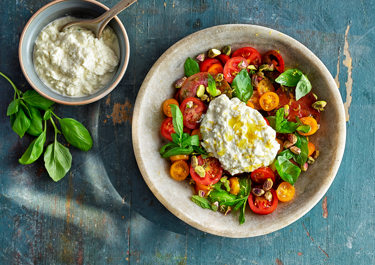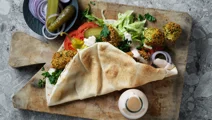Burrata
&format=webp)
Burrata is a delicacy mozzarella from Apulia made from a mixture of mozzarella and cream. Try making your own using whipped mozzarella and sour cream. Top the cheese with mint, basil, lemon, and pistachios for a real taste sensation!
Ingredients
Burrata
|
Fresh mozzarella
|
250 g |
|---|---|
|
Sour cream 30%
|
150 ml |
Tomato salad
|
Mixed tomatoes
|
500 g |
|---|---|
|
Fresh basil
|
1 bunch |
|
Fresh mint
|
1 handful |
|
Finely grated zest of 1 lemon, unwaxed
|
1 |
|
Roasted pistachios
|
50 g |
|
Cold pressed olive oil
|
|
|
Flake salt
|
Instructions
Step 1
Step 2
Step 3
Storage tip
Burrata is always best enjoyed fresh and, once cut into, leftovers will quickly lose its creamy, cheesy contrast and texture in the refrigerator. Whole burrata should be tightly wrapped in clingfilm, placed in an airtight container, and refrigerated for up to two days.
Questions about burrata
Burrata is a fantastic Italian delicacy you will love for sure. Keep reading the frequently asked questions to learn more about it!
What is the difference between mozzarella and burrata?
While these two cheeses taste similar, burrata's texture is thinner, creamier, and much richer than mozzarella. This is mainly due to it being a filled cheese with an outer layer of mozzarella encasing a luxurious filling of cream and cheese curd.
Do you eat burrata warm or cold, or both?
This delicate cheese is best enjoyed at room temperature. We recommend that you take it out of the fridge about 30 minutes before serving.
Do you leave burrata in water?
While not strictly required, many store-bought burratas are preserved in a salted brine or water to preserve its moisture.
Can you eat burrata raw?
Raw and freshly made is arguably the very best way to eat this delicacy. A baked burrata, however, is equally good and makes for an elegant and sophisticated starter at any dinner party.
Balls of heavenly creaminess
As with many of today's iconic foods, burrata has its origins in frugality and was invented in the 1920s by Lorenzo Bianchino Chieppa, an Apulian cheesemonger, as a way of using leftovers from the cheesemaking process. Today, this creamy delicacy can be found across the globe in high-end food stores and home kitchens alike.
Different types of burrata
Traditional burrata is made from cow's milk. With an outer layer of mozzarella, it hides a decadently creamy inner of cheese curds and cream that spill onto your plate. With a delicate flavour, the cheese can easily be transformed by the toppings used. Our top three combinations are fresh herbs, lemon, chopped pistachios and olive oil; chopped figs and slivers of prosciutto; and fresh summer fruits like berries, melon or stone fruits with a drizzle of honey.
How best to enjoy burrata
Freshly made burrata is always the best way to enjoy this delicate cheese. Many aficionados would also recommend that it is eaten at room temperature for an even creamier, melt-in-your-mouth texture.








